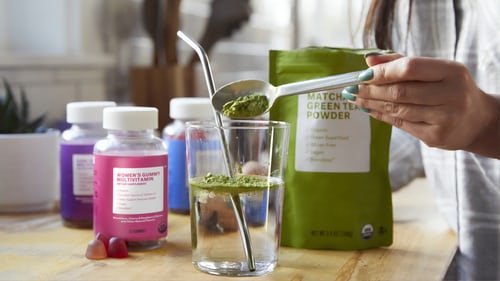Direct-to-consumer or DIY DNA test kits are now available for purchase in many Chemists throughout Australia as well as online and as with just about any other new product introduced into the health industry scepticism and opinions as to their credibility and accuracy abound.
Today’s post bypasses the opinion, controversy, ethics and individual beliefs to simply provide the facts on what exactly direct-to-consumer DNA test kits are, why someone may choose to use one and how accurate they actually are.
As well as this I end with some suggestions you may like to consider for best value options to find out how you can utilise what you eat in ways to prevent disease and promote both your short and long term health.
What Is A Direct-to-Consumer DNA Test Kit?

A direct-to-consumer DNA test kit simply comprises instruments which allow you to take a swab of you cheek cells (some kits also include the need to provide blood samples) which are then sent off for the DNA within those cells to be analysed.
Depending on the test kit used the DNA sample is analysed for a number of genes linked to body shape, metabolism and the ability to lose and gain weight, fat storage, the risk of having high cholesterol levels, how your body processes some chemicals within foods (for example caffeine) and to predict health issue such as risk for certain diseases (including cardiovascular disease and breast cancer).
What A Direct-to-Consumer DNA Test Kit Claims to Provide

Armed with this knowledge you are then recommended to follow a particular type of diet claimed to be tailored to your individual genetic profile and therefore the “best” for your health outcomes and goals.
Are Direct-to-Consumer DNA Test Kit Results Accurate?

Clearly, these tests leave ample room for problems to arise due to inaccuracies in the information given. Including unnecessary stress over false positive results which has indeed been found to be a real possibility and in a study of the BRAC1 and BRAC2 genes associated with breast cancer published in July of this year it was found 96% of the genetic variance given by direct-to-consumer kits were false positives1.
Another study published in 2018 found 40% of variants in a variety of genes reported in direct-to-consumer raw data were false positives2. On top of this the same study showed some variants labelled as “increased risk” by direct-to-consumer DNA results were found to be benign and even known to be common variants in publicly available population frequency databases2.
The other side of the coin is where false negatives may result in a false sense of security and potentially lead to under treatment.
In a nutshell these home DNA test kits don’t yet appear to be highly accurate or useful especially when compared to other measures of improving health. Which should come as no surprise given that health conditions are determined not only by genetics but by a combination of other risk factors including diet, lifestyle and environment.
Therefore, any use of genetics to determine health risks is only going to capture a small part of the story and on top of this it’s a part of the story that is itself amenable to change given that we now know genes can be up or down regulated due to the above risk factors (diet, lifestyle and environment) and are not simply expressed because that’s what’s written in your DNA.
To highlight the unreliability of genetic testing especially for some illnesses Dr. William Li cites only around 10% or less of cancers are detected by genetic screening which means 90-95% of risk of developing cancer is essentially environmental (of this 90-95% between 30-35% is linked to diet).
The fact is the development of the majority of illnesses not just cancer are multifactorial.
The Bottom Line

Can you eat in ways which prevent disease and promote health? Yes (just like genetics though it’s important to remember diet is not the be all and end all of health).
Do I need to analyse my DNA to find the best diet for me in order to do this? No, not at all.
While I wouldn’t dismiss direct-to-consumer DNA testing altogether and there is definitely interesting research and developments going on in this area direct-to-consumer DNA test kits at this stage should not be thought of as anything more than perhaps a means of becoming more interested and involved in your health.
Genetic tests sold in store or online should definitely not be used as a standalone to base any important health decisions off.
If you are concerned that your weight (direct-to-consumer DNA test kits are most commonly marketed as helping people eat to achieve weight loss) or diet is affecting your physical or mental health please consider seeing your GP for referral to an accredited practicing dietitian (APD) or book in to see an APD directly.
For diet concerns it is always best to go with good old fashioned face to face advice from a nutrition expert (an APD is a universally recognised nutrition expert) because what you eat undeniably plays a large role in your health outcomes and there is no question that dietary advice needs always be individualised and tailored to the individual.
However, if this tailoring is solely based on your genes this is probably the least useful of all the areas to address or at least in isolation isn’t as supremely valuable as it could be when all aspects of your lifestyle and living environment are taken into consideration.
Direct-to-consumer DNA test kits may claim to take the guess work out of what to eat and tailor a diet program to your needs but working with a trained dietitian for personalised nutrition advice has the added benefit of allowing you to build the skills and confidence to listen to and respond to your bodies cues (you don’t need a DNA test to tell you that you have a gene that makes bitter foods taste extra bitter you can taste that yourself and trust your body).
Your empowerment should always be the goal of any realistic and useful nutrition therapy and a DNA test and strict diet plan simply doesn’t foster that.
Even if the results of these tests were accurate it is arguable that it would do little to alter your behaviour anyway as it is well known behavioural change is not a by-product of education and knowledge. Which is another reason why it is always best to promote working with a trained nutrition professional (APD) for lasting change.
With My Whole Heat I Hope You Found This Information Useful & Inspiring.

Become Great. Live Great.
Bonnie.
Reference
- MN Weedon, L Jackson, JW Harrison, KS Ruth, J Tyrrell, AT Hattersley, CF Wright. Very rare pathogenic genetic variants detected by SNP-chips are usually false positives: implications for direct-to-consumer genetic testing. Jul. 9 2019. 1-12.
- Tandy-Connor, S., Guiltinan, J., Krempely, K. et al.False-positive results released by direct-to-consumer genetic tests highlight the importance of clinical confirmation testing for appropriate patient care. Genet Med. 2018. 1515–1521.



